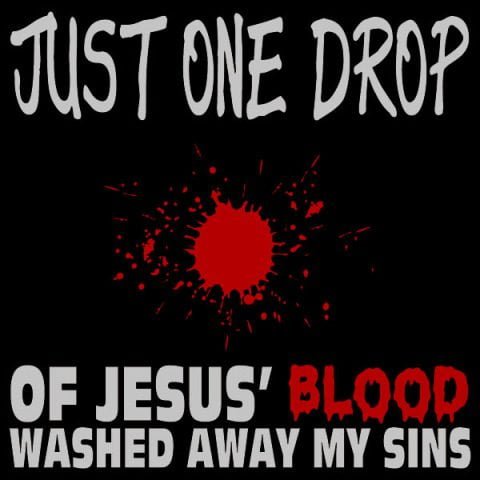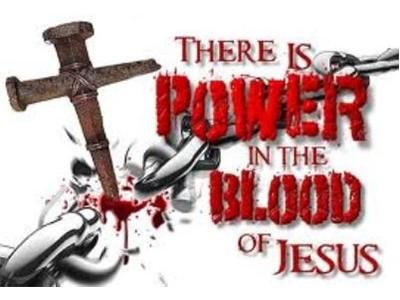
Christianity is a blood cult. Catholics (and Greek and Eastern Orthodox), for example, believe that when they partake of communion the elements supernaturally transform (transubstantiation) into the flesh and blood of Jesus. They are (literally) drinking and eating the blood and flesh of Jesus. Other sects such as Lutherans practice consubstantiation; the flesh and blood of Jesus are present in communion elements, but the elements do not supernaturally transform into the blood and flesh of Christ. Methodists, Presbyterians, and other protestant sects generally believe in the real presence of Jesus in the communion elements. Most Evangelicals practice memorialism. Communion is a memorial to the blood sacrifice and death of Jesus. It is a reminder of what Christ has done on our behalf on the cross.
Regardless of how the communion elements are viewed, the focus of the ritual is the shed blood of Jesus; his atonement for humankind’s sin. This is why Christianity is a blood cult, no different from sects that in the past or present either use animal or human blood in their worship practices. While Christian communion has become normalized, its history traces back to blood cult worship practices of Canaanite tribes.
Let’s suppose I start a church that is opposed to blood cult rituals; a church that views communion as an affront to all that is holy and true. Let’s suppose I wrote a Bible for this new church, one that said offering blood sacrifices to Jesus is a mortal sin and an affront to the one true god, Loki. Let’s suppose this church believes that Christian churches are cult temples, places where children are indoctrinated into believing nonsense such as transubstantiation, consubstantiation, or memorialism.
Believing these blood cult practices are a threat to the health and future of our country, this new church decides to vandalize Christian churches by spraying WARNING BLOOD CULT! DO NOT ENTER UNDER RISK OF ETERNAL DAMNATION! on the exteriors of their buildings. There is one true God, and Loki is his name! The Bible says __________! Surely, our vandalization of Christian church buildings would be justified, right? After all, we were just standing up for our God and the teachings of the “real” Bible. Shouldn’t religious beliefs trump everything, including laws governing vandalizing the property of others?
Americans with any understanding of the U.S. Constitution and our legal system will object, saying that it is never right to vandalize churches, even if one disagrees with their beliefs and practices. The Constitution grants Americans freedom of (and from) religion, regardless of beliefs and practices. In other words, Americans are free to believe crazy shit; and believe me, crackers and wine turning into flesh and blood of Jesus is “crazy shit,” as is the virgin birth, the resurrection of Jesus from the dead, and the various “miracles” attributed to Jesus. Crazy stuff, to be sure, but people are free to believe as they wish.
You would think that Evangelicals (and conservative Catholics and Mormons) would be big defenders of the freedom of (and from) religion and the separation of church and state. Surely Evangelicals want the government and outsiders to stay out of their business; if they want to engage in blood cult rituals, they should have every right to do so. And I agree with them. If snake-handling Primitive Baptists in Kentucky want to handle rattlesnakes during their worship services, believing, according to Mark 16, that God will protect them if they are bitten, who am I to object? Evangelical churches do all sorts of stuff that outsiders might view as whack-a-doodle nonsense, but just because others can’t or won’t understand or accept a religious practice doesn’t mean Evangelicals should stop doing it.
Unfortunately, many Evangelicals give lip service to the First Amendment when it comes to religion. They want the freedom to practice their religion as they wish, yet they don’t want to grant that same right to non-Christian sects, pagans, atheists, agnostics, humanists, and Satanists (both those who worship Satan as a literal being and those who view him as symbol, as is the case with The Satanic Temple).

I am a member of The Satanic Temple. I support and applaud their work defending the separation of church and state. I appreciate their frontal assaults on Christian privilege. Christian churches and parachurch organizations have been abusing the U.S. Constitution my entire sixty-seven years on planet Earth. Wrongly thinking the U.S. is a Christian nation, Evangelicals, in particular, think Christianity should receive preferential treatment. They want the right to have release time programs at public schools such as Lifewise Academy, but don’t want non-Christian groups to have the same right. The Satanic Temple is challenging the preference and reverence public schools give Christian groups by sponsoring After School Satan Clubs for non-Christian children. Predictably, clueless to their own preferential treatment, Evangelicals and other conservative Christians are outraged over school boards permitting “Satan” in public schools.
This past week, we saw this played out in Iowa. The Iowa legislature allows groups to put up displays at the state’s Capitol. Evangelicals, of course, have put up creches and other pro-Christian displays. The Satanic Temple put up a display, one that featured a statute of Baphomet. Local Evangelicals were outraged over “Satan” making an appearance at the Capitol. One Christian, Michael Cassidy, vandalized the statute, removing its head and throwing it in the trashcan.
Cassidy explained his actions this way:
The world may tell Christians to submissively accept the legitimization of Satan, but none of the founders would have considered government sanction of Satanic altars inside Capitol buildings as protected by the First Amendment. Anti-Christian values have steadily been mainstreamed more and more in recent decades, and Christians have largely acted like the proverbial frog in the boiling pot of water. I saw this blasphemous statue and was outraged. My conscience is held captive to the word of God, not to bureaucratic decree. And so I acted.
Cassidy was charged with fourth-degree criminal mischief. You would think that Evangelicals would condemn Cassidy’s criminal behavior, but that is not what has happened. Instead, Cassidy is being applauded for his stand against Satan and his defense of Biblical Christianity.
Ray Fava, at the Evangelical Dark Web, said:
The actions of Michael Cassidy were lauded by Christians online as an example of confronting idolatry.
Paul Brown, a writer for Protestia, stated:
Cassidy’s actions, while in defiance of the Radical Two Kingdoms Ideology of many American evangelicals, are reminiscent of those of the 8th-century missionary Boniface. When confronted with the fact that the Saxons had cultivated a type of syncretism that allowed for the worship of Jesus as one of the many gods in the pantheon, Boniface took an axe to their theory, chopping down Thor’s tree, a pagan shrine, in an act that showed the impotence of the pluralistic pantheon of the Saxon’s. Rubbing the noses of the pagans in their idolatry, Boniface used the wood of Thor’s tree to construct a church.
While many of the “mostly peaceful protestors” of 2020 who destroyed statues escaped prosecution, it is likely that Michael Cassidy will be prosecuted to the full extent of the law for his actions. The act of smashing idols in the Iowa Capital will undoubtedly be at the center of the “Christian Nationalism” debate in the days to come. However, one thing is certain: Baphomet, a mere creation of idolaters, is just as weak as Baal, and he won’t be defending himself or his adherents.
Good brothers are disagreeing about the moral and ethical particulars of what happened (almost as if the “Satan” stunt was designed to drive us even further apart), but we can confidently say both that the display was not actually about the real Satan and that Iowa lawmakers should never have gullibly approved of its display.
In our free speech legal tradition, citizens are not discriminated against by not having open access to put up displays in a government building, nor are their rights violated by seeing a display that they disagree with or find offensive, even in a government building. Speech is not violence. The “Satanic” Temple’s identity as a religion is itself a lie, and their adoption of Satan (who is real and has a defined moral identity) is itself a promotion of lawlessness and evil. Our country does not recognize a right to lie nor a right to openly advocate for lawlessness, and Iowa lawmakers should have rejected the group’s childish display as the silly stunt that it was.
As believers, we know that idols and idolatrous displays (much like the food sacrificed to them) have no power. They cannot harm us. In this case, the goofy display of Baphomet put up by the “Satan” group merely joined the chorus of offensive expressions against God that believers are subjected to daily. It is proper that we are offended when we hear or see expression offensive to God, yet in this case we should also be offended by the lack of courage and/or competence of lawmakers who fail to understand that expression cannot be disconnected from meaning.
Much like we are morally obligated to the objectivity of language by insisting (for example) that “male” and “female” correspond to biological reality, a group that identifies with “Satan” should bear the identity of all that Satan implies. They do not get to redefine it, and they don’t get to troll everyone with Satanic idols and then claim “Why you mad, Bro?” non-theism as soon as everyone reacts as if they are truly overtly worshipping Satan. It was a lie, and Iowa lawmakers were stupid for going along with it.
Incidents like this are far more useful to the enemies of Christ than to his people. We were already outraged at the display and at the lawmakers who allowed it. While less consequential, a conservative Christian destroying property to “awaken Christians to government promotion of anti-Christian acts” (despite the categorical difference between allowing expression and endorsing it) is judicially identical to tearing down a statue of Mary outside a Catholic church or spraypainting “Christ is Lord” on the side of a Mosque. It gives fuel to the enemies of Christ by granting undue influence to those seeking to marginalize the Gospel as a message that needs violence and censorship to advance.
Jeff Maples, the operator of Disntr, chimed in:
The display in question featured a statue of Baphomet, a demonic figure that has long been associated with various occult and mystical traditions and is often interpreted as a symbol of Satan. This particular statue’s presence in a state capitol was a deliberate attempt by the Satanic Temple to assert their “rights” under the First Amendment.
Cassidy, however, took it upon himself to tear down this idol, a brazen embodiment of anti-Christian sentiment, and behead the silver ram’s head of the statue. According to Cassidy, it was a statement about a religion, Christianity, that is under siege in places where it should be respected.
….
This statue of Baphomet, a demonic figure, wasn’t merely an expression of artistic freedom—it was a calculated affront, a provocative act designed to incense and belittle the Christian community. The mere presence of such a symbol in a government building is a mockery of our nation’s Christian heritage—a heritage that has been the cornerstone of our moral and ethical compass.
….
While Cassidy’s actions have led to legal repercussions, with him facing charges of fourth-degree criminal mischief, his bold stand has resonated with many. The financial support pouring in to cover his legal fees is a testament to the widespread support for his cause—a cause rooted in the defense of faith against the encroachment of sacrilegious mockery.
In times like these, where the lines between right and wrong are blurred by the brushstrokes of political correctness and cultural relativism, it takes the courage of men like Michael Cassidy to remind us of the values we stand for. His actions, while controversial, demonstrate that there are still those who are willing to take a stand against the tide of secularism and sacrilege.
As the legal proceedings unfold, Cassidy’s stand at the Iowa State Capitol will undoubtedly continue to spark debate and discussion. But one thing remains clear, his actions have become a symbol of resistance, a resistance against the encroachment of blasphemous symbols in spaces that should honor our nation’s foundational values. Michael Cassidy’s story is not just about a legal battle, for many, it’s about the battle for the soul of a nation.
James Lasher, a writer for Charisma News, opined:
In an act of religious conviction, Michael Cassidy, a Christian and former military officer, recently tore down and beheaded a controversial Satanic altar at the Iowa Capitol. The display had already sparked ongoing debate about the role of religious displays in public spaces and the limits of free speech.
The Satanic Temple of Iowa had recently received permission to install the exhibit, which included a statue depicting the idol Baphomet holding a pentacle and surrounded by candles, on the first floor of the Iowa Capitol near displays of the Nativity. Cassidy pushed over and decapitated the statue before discarding the head in a trash can.
….
In comments exclusively provided to The Sentinel, Cassidy said that he destroyed the shrine to “awaken Christians to the anti-Christian acts promoted by our government.” He cited 1 John 3:8 as an additional motivation for his actions: “The reason the Son of God appeared was to destroy the works of the devil.
Some have questioned whether the Constitution or the original intent of the founding fathers would allow for the existence of the shrine. Andrew Walker, an associate professor of Christian ethics at Southern Baptist Theological Seminary, argued that the state should not promote any “outright celebration of evil, darkness and perversity” and that “moral evil has no intrinsic rights” within a Christian and historically Western legal framework.
Cassidy will be represented by Davis Younts, an attorney and retired Air Force lieutenant colonel who served in the JAG Corps. “My client was motivated by his faith to peacefully protest a display that is a direct affront to God,” Younts told The Sentinel. “When others, including elected leaders, were unwilling to act, he peacefully removed the display. It is my hope that the citation will be dismissed when my client’s actions are understood and that he will not face prosecution because of his faith.”
Cassidy’s actions mirror King Hezekiah’s in the Bible when he tore down the High Places. Second Kings 18:4 says, “He removed the high places, broke the sacred pillars, cut down the Asherah poles, and crushed the bronze serpent that Moses had made, for until those days the children of Israel had made offerings to it.” Like King Hezekiah, Cassidy felt compelled to take action against abominable idols that were abominable to the Lord in whom they both trust.
These Evangelicals make it clear that Cassidy was justified in vandalizing the statute. Why? It was an affront to Christianity; a mockery of the faith of millions of Americans. Should any of us be permitted to vandalize and destroy anything that offends our personal beliefs, religious or otherwise? Of course not, but the Evangelicals quoted above think otherwise. If Evangelicals can behead “Satanic” statutes or destroy the holiday displays put up by the Freedom From Religion Foundation, why can’t I and my aforementioned new church spray in bright red letters WARNING BLOOD CULT! DO NOT ENTER UNDER RISK OF ETERNAL DAMNATION! on the front of Evangelical churches? Surely “freedom” of religion applies to everyone, does it not?
Numerous Evangelical leaders and politicians have said that constitutional protections of religious expression and practice don’t apply to The Satanic Temple; and that the United States is a Christian nation. Presidential hopeful and professional asshole Ron DeSantis stated: “Satan has no place in our society and should not be recognized as a ‘religion’ by the federal government.”
Lucien Greaves, the co-founder of The Satanic Temple, replied:
We don’t want to yield some kind of power to the government to begin picking and choosing between religious groups. People might hate us and people might want to exclude us, but that simply opens the door to more sectarian battles, and it certainly won’t stop there.
These pro-vandalization Christians think the law applies to non-believers, but not them; that the criminal destruction of the property of others is justified if personal Christian beliefs are offended.
Bruce Gerencser, 66, lives in rural Northwest Ohio with his wife of 45 years. He and his wife have six grown children and thirteen grandchildren. Bruce pastored Evangelical churches for twenty-five years in Ohio, Texas, and Michigan. Bruce left the ministry in 2005, and in 2008 he left Christianity. Bruce is now a humanist and an atheist.
Connect with me on social media:
Your comments are welcome and appreciated. All first-time comments are moderated. Please read the commenting rules before commenting.
You can email Bruce via the Contact Form.





